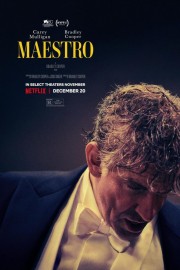Maestro
In “Maestro,” Leonard Bernstein wears multiple hats so effortlessly that he expects those closest to him to just accept it. Composer, conductor, husband, father, musician, lover- Bernstein was all of these things, and yet, we feel, in Bradley Cooper’s film, that it wasn’t enough for him to just excel in any one area at one time; he wanted all of this, at once. I think this is what Cooper is trying to illuminate the most in his film; depending on how much we think he succeeds, we’ll be able to go with the film’s structure, or we won’t. I did, very much so.
Sometimes, a composer has to go through chaos to find clarity in the art of creation. This feels like it’s the structural approach Cooper and co-writer Josh Singer are making in telling Bernstein’s story. Take the film’s first scene in black-and-white- Lenny (played by Cooper) is in bed with a young man when he gets a call. This is the fateful call that gives Bernstein the opportunity to conduct at Carnegie Hall for the first time, starting his career proper. The way Cooper and cinematographer Matthew Libatique shoot this scene it’s a reflection of the way his life goes from the simple pleasures to something completely outsized in an instant. From there, it’s off to the races for Bernstein. When he meets Felicia Montealerge (Carey Mulligan), it’s instant love on both sides, but can she keep up with a man whose love is as far stretched as his talents?
As a follow-up to “A Star is Born,” this makes a lot of sense for Cooper. Both films are essentially about the complicated nature of relationships between creative people, especially when one’s career skyrockets while the other one stagnates. The differences come in the framing. In “A Star is Born,” Cooper played someone whose career peak has past, and struggles to accept that someone he discovered has surpassed him. In “Maestro,” it’s not a matter of artistic jealousy that threatens the relationship between Leonard and Felicia, but rather the way that Lenny approaches his personal life outside of their marriage. In the scenes that bookend the film, and in scenes along the way in the film, we can see that Bernstein does love and value Felicia, but dalliances with younger men are not always out of view; he is fairly open with his affections. And yet, even as their marriage seems to implode emotionally, when Felicia needs him most, he is there for her. I love a moment late in the film where Lenny, faced with Felicia’s failing health and cancelling a professional opportunity, he puts Felicia first. His fame was long cemented by that point; his family was all that mattered, and it is one of the strongest moments in Cooper’s performance.
Much has been made about the prosthetic nose Cooper wears for the role. Now, having watched the film, I find that there were scenes and shots where it was not as noticeable, and others where it was clear as day and a distraction. Personally, I think Cooper’s performance would have stood up better had he not worn a prosthetic nose, but I love his commitment to the messy, outsized individual his Bernstein is from the first moments of the film to when the credits role. Yes, it is over-the-top, but there’s something about it that reminds me of Tom Hulce’s Mozart in “Amadeus.” Both are artists whose passion for their art emanates in every movement they make, whether it’s from the conductor’s podium or during a party or an intimate moment. Mulligan’s Felicia is the opposite, an artist whose commitment to her craft is more internal, as is her commitment to their family life. She is comfortable as the mother and caregiver, but you can also see the tension between their two approaches to life. She is a wonderful contrast to Cooper in this film.
(Many have brought up the schism in representational casting in the roles of Lenny and Felicia by not having someone Jewish play Bernstein or someone of Costa-Rican or Chilean descent to play Felicia. While I will always support anything that leads to more accurate representation in cinema and TV, I think “Maestro” would certainly be a different movie with other actors in the roles, but I’m not sure if it would have been a better one.)
“Maestro” is a film that resonated with me in a lot of ways. As someone whose love of music came- to a certain extent- from being exposed to his music in high school when we did a medley of his work as a marching band show my sophomore year. As someone who always will find themselves interested in biopics about musicians, curious how they might succeed or fail. And as someone who has spent my entire adult like juggling multiple responsibilities to both my own creative interests and my relationships with others, and understanding how difficult that is. The film has a centerpiece moment where Bernstein is conducting an orchestra in a church, that really sums up “Maestro” well as a film of bravado and grandeur that, if it was lacking in either, might not have succeeded quite as well. This is a film where Bradley Cooper swings for the fences with his creative ambitions, and had me captivated every step of the way.










